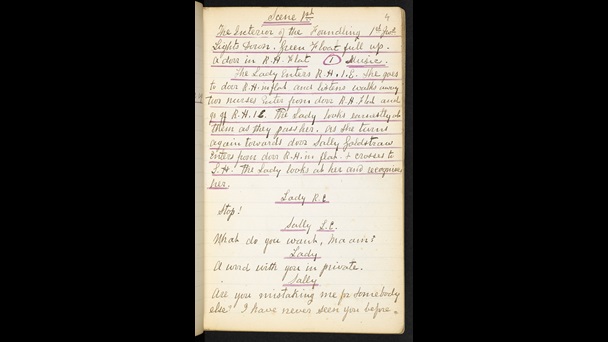Victorian Urban Legend: the Expensive Manuscript December 12, 2016
Author: Beach Combing | in : Modern , trackback
Beach now has a couple of difficult days as he leaves his old university and says goodbye to a particularly fine cohort of students. Here is some more manuscript nonsense to keep him and you distracted. Is this urban legend? Probably but pleasing.
A celebrated authoress wrote a drama, which she committed to the manager of Covent Garden Theatre [London]. Calling some time after, she found that it had been mislaid and, on again requesting an answer regarding it, the manager told her the manuscript was lost. It had been hunted for everywhere, he said, without success. Howbeit, he affirmed the piece, before its loss, had been read and reported perfectly unfit for representation. ‘That is all vastly well,’ said the lady, ‘but you must return it to me, or else pay what I consider its worth, namely, one hundred pounds.’ ‘But I tell you,’ said the manager, ‘its value is absolutely nothing. It couldn’t possibly be acted, madam. Its scenes are incomparable, its dialogue incomprehensible, its plot incredible. It is valueless, madam, utterly valueless.’ ‘To you, perhaps,’ said the lady, ‘but not to me. So play or pay.’
Can you see where this is going?
In fine, the money was paid. A year afterwards, while clearing out an old closet, lo, the lost manuscript. ‘Damn, the play,’ said the manager, handing it to a friend who was present, ‘it has cost me one hundred pounds. Throw it into the fire. The very sight of it makes me sick.’ ‘Stop,’ said the friend, opening and looking at the manuscript, ‘since it has cost hundred pounds, let us consider the matter, and, if possible, put it upon the stage.’ After some controversy, the manager consented that the piece should be acted, and, to the astonishment of himself and friend, it had a tremendous run, and was the most successful drama that had been brought out for years.
There were not many celebrated female playwrights in the late eighteenth and early nineteenth century in the UK. Can anyone help track this down to an alleged artist? Drbeachcombing At yahoo DOT com
17 Dec 2016: LTM ‘Sounds too much like Wellington’s story (publish and be damned) transposed into another arena.’


